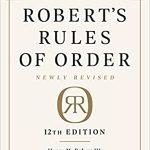Posts
My nephew was visiting us last weekend when he was hijacked. One moment, he was an affable, engaged and charming member of the family — the next, a seething mass of rage and anguish. I reacted with compassion. I knew that he doesn’t yet have the skills to prevent his amygdala from taking over. But…
Over the years Jurassic Parliament has been a strong supporter of “action minutes.” We agree with Robert’s Rules of Order that the fundamental purpose of minutes is to record official actions taken by a governing body. Minutes are a legal record and document what the body has done. This is true for elected councils, appointed…
People are sometimes confused about precedence of motions in Robert’s Rules of Order. In essence it is rather simple. The principle is that each motion has a number or rank. When motions are pending, motions with a higher rank may be made, but motions with a lower rank are out of order (not allowed). The…
What is a “friendly amendment” in Robert’s Rules of Order and parliamentary procedure? This term is frequently misused. Here is our explanation: (1) An amendment is a proposal to change a motion – a proposed action – being considered by a group. (2) Sometimes people suggest amendments with the intention of making the original motion…
The 12 edition of Robert’s Rules has just been published. More information coming soon.
PlannersWeb, a long-time source of excellent advice for planning commissions, has now made all its content available free to all. Check out their website for dozens of invaluable articles and to-the-point guidance. If you are a citizen member of a planning commission, a staff planner, or elected official concerned with planning issues, you’ll find much relevant advice…
My new folding business card includes a “cheat sheet for the chair.” It’s our summary of what the person running a meeting really needs to know (see below). I gave one to a senior elected official this week. He read the first line and said, half-joking, “the servant of the group, not the boss?! That…
It sometimes comes as a shock to newly elected leaders that running good meetings requires being a dictator. It is essential for the chair of a meeting to enforce the rules that the group has decided upon for fair discussion. If your board has adopted an agenda that allows 20 minutes for a given topic,…
As a longtime fascinated observer of civic and nonprofit boards, I’ve noticed some interesting things happen from time to time. Some examples: An elected board member who is a CPA decides that he’s not satisfied with the district’s financials, so he prepares his own version for the directors to review. A director who believes ardently…
Meetings of one type or another can take up to half of the average work day and keeping them productive can sometimes be a challenge. But there’s one simple guideline that can save time and improve the content of daily meetings by a thousand percent and it’s this: No one may speak a second time…








